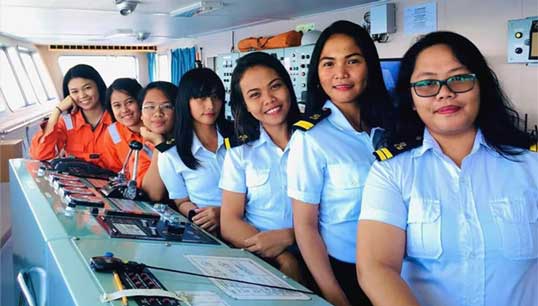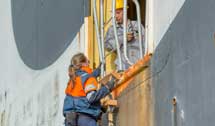- Topics
- Campaigning
- Careers
- Colleges
- Community
- Education and training
- Environment
- Equality
- Federation
- General secretary message
- Government
- Health and safety
- History
- Industrial
- International
- Law
- Members at work
- Nautilus news
- Nautilus partnerships
- Netherlands
- Open days
- Opinion
- Organising
- Podcasts from Nautilus
- Sponsored content
- Switzerland
- Technology
- Ukraine
- United Kingdom
- Welfare
Women In Maritime: diversity benchmarking report highlights bright spots in fragmented industry
18 May 2022

A new global gender diversity benchmarking study, published by the International Maritime Organization (IMO) on its first Women In Maritime day, shows that while female representation is increasing in some sectors much work still has to be done in others.
Women make up one fifth of the workforce of the 500 surveyed maritime authorities and agencies of the Member States, according to the inaugral report by the IMO and the Women's International Shipping and Trading Association (WISTA). However, this is still in line with general industry data that women make up only 2% of the maritime workforce globally as gender diversity is extremely fragmented by sector, according to the data.
WISTA International president Despina Panayiotou Theodosiou said: 'The knowledge we have gathered about gender diversity in the maritime industry through this first Women in Maritime Survey 2021 is an important step in our ambition to create holistic gender diversity. As a first snapshot, this survey gives telling evidence of how much work still needs to be done. But it also shows us where there are a few bright spots. The maritime industry can see for itself which sectors are pushing ahead with diversity, and which are not.'
The report contains insights about the proportion and distribution of women working in the maritime sector, showing that women account for only 29% of the overall workforce in the general industry and 20% of the workforce of national maritime authorities in Member States.
A higher response rate for would, however, help validate – or disprove – the findings, says the report. Member States must be encouraged to start collecting relevant data on female participation ahead of the follow-up survey planned for 2024.
IMO Secretary-General Kitack Lim said: 'Benchmarking the current state of the sector is vital to measure where we are, and where we need to go. The Women in Maritime Survey 2021 shines a spotlight on areas in which IMO Member States and the wider maritime industry are performing well – and, more importantly, those where additional attention, resources and encouragement are needed. By actively empowering women with the requisite skills, maintaining a barrier free working environment, we create truly sustainable systems of gender equality.'
On a positive note, of the 45 Member States which provided data, 41 have already introduced measures to ensure gender equality within their recruitment and promotion process. Some of these measures do not involve any financial resources, such as the neutral use of language in job applications or having a diverse interview panel.
Half of the responding Member States said they ensure pay equality for positions, which is an important step for retention of staff in the maritime industry.

Report findings
Women in the workforce
- 14% of staff in core roles are female – a long way away from a balanced gender split.
- 10% of search and rescue teams in national maritime authorities have women staff, 'significantly fewer' compared to female diplomats (33%) and training staff (30%).
- most of the female workforce is in the age range between 25 and 44 years
- the report highlights general industry data which shows of the 2% of women in the crewing workforce globally, most are found in the cruise sector, while in shipowning companies they make up 34% of the workforce
- 41 Member States have introduced measures to ensure gender equality within their recruitment and promotion process
- half of the responding Member States ensure pay equality
Image: IMO/Flickr
Diversity activities
- the survey is one of the diversity and inclusion promotional activities under the 2020 IMO-WISTA Memorandum of Understanding (MoU)
- the survey contributes to initiatives to support the Sustainable Development Goal 5 on gender equality.
What next?
- measuring progress: IMO and WISTA intend to repeat similar surveys every three years to continue to measure progress and provide guidance for maritime companies and member states on the appropriate allocation of resources.
- driving diversity through data: IMO-WISTA MoU are also developing a database of female conference speakers – experts in a wide range of maritime subjects who will be available to contribute towards more diverse panels at maritime conferences and beyond the sector
Tags
